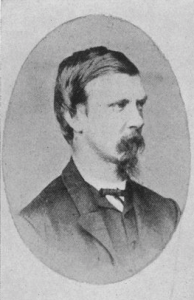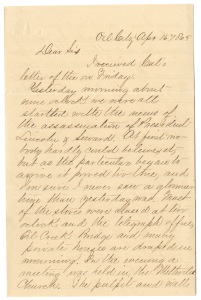
On April 15, 1865, Capt. William A.F. Stockton took a moment to write his cousin while the weary troops of 140th Pennsylvania Volunteers took a much-needed rest.
A native of Washington County, Pa., Stockton recounted the remarkable events of April 9, when he had engaged in a skirmish with General Robert E. Lee’s troops near the Appomattox Court House in Virginia. Upon spotting a white flag from the Confederates, Stockton ordered his soldiers to halt and immediately sent word to his commanding officer. Soon after, Gen. Ulysses S. Grant arrived at the court house to meet Lee and establish the terms of surrender. “I think I can safely and truly say, that we have seen the last ditch, in the old Dominion state. I cannot here, depict to you the great joy that was manifested when it became known that the enemy was hemmed round, on all sides. We did not expect a surrender, but on the contrary, a bloody engagement.”
Before closing, Stockton relayed some disturbing gossip that had been spreading through camp. “There is a very queer rumor in the army this evening that President Lincoln is dead, and that he was assassinated at Ford’s Theatre by some masked men, also that Secretary Seward was also killed and Vice President Johnson. We do not place any credence in the report and believe it to be one of the army hoaxes, so often floating in the air.”

Stockton’s letter is one of a handful of documents in the History Center’s Detre Library & Archives that captures the initial reactions of Western Pennsylvanians to the news of Lincoln’s assassination. What was merely gossip in Stockton’s camp had at that point been confirmed in Oil City, Pa.
Edwin Dawson, who served with Company B of the 193rd Regiment of the Pennsylvania Volunteers, wrote about hearing the news on the morning on April 15. “Yesterday morning about nine o’clock we were all startled with the news of the assassination of President Lincoln & Seward. At first nobody could hardly believe it – but as the particulars began to arrive it proved too true, and I’m sure I never saw a gloomier time than yesterday was. Most of the stores were closed at two o’clock and the telegraph office, Oil Creek Bridge, and many private houses are draped in mourning…I don’t believe any defeat we have had since the war began has had such an effect on the people as the death of Lincoln.”
Dawson’s letter also reveals that even in the North, reactions to Lincoln’s death were not always unanimous. Copperheads, Northern Democrats who strongly opposed the president and the Civil War, didn’t necessarily temper their criticisms following Lincoln’s assassination.“Yesterday morning when the train came in, a copperhead standing near the depot was overheard to say, when he heard the news ‘Good, he got what he deserved.’ He was immediately knocked down and the crowd were going to drown him in the river and it’s a pity they didn’t.”
These are just a couple of examples from the many letters, diaries, and other primary sources at the Detre Library & Archives that provide a glimpse into momentous local and national events as they unfolded.
Collections referenced:
William A.F. Stockton Letter, 1865, MFF 2073
Dawson-Montgomery Family Papers, 1849-1961, MSS 101
Matthew Strauss is the chief archivist at the Detre Library & Archives at the Heinz History Center.